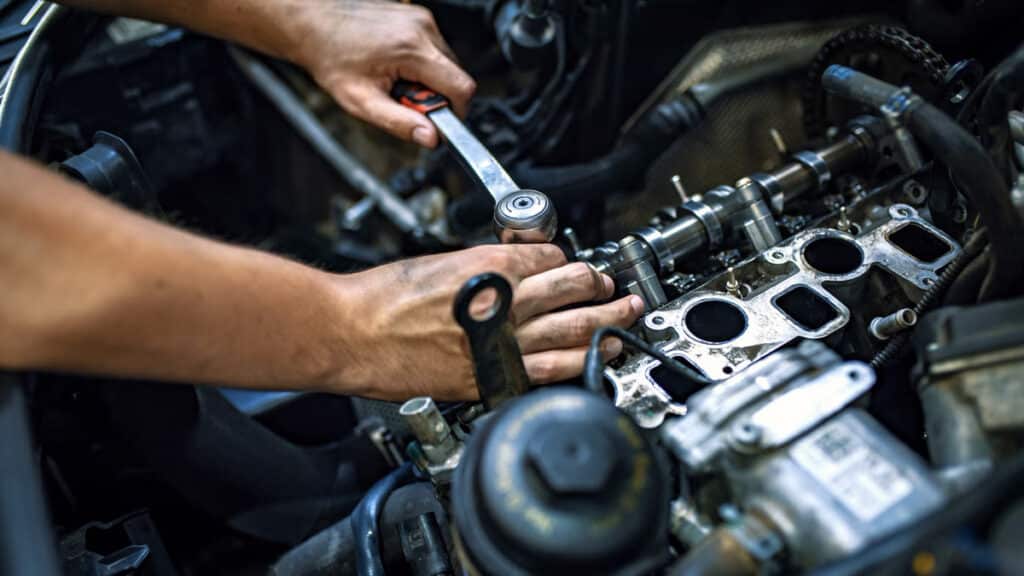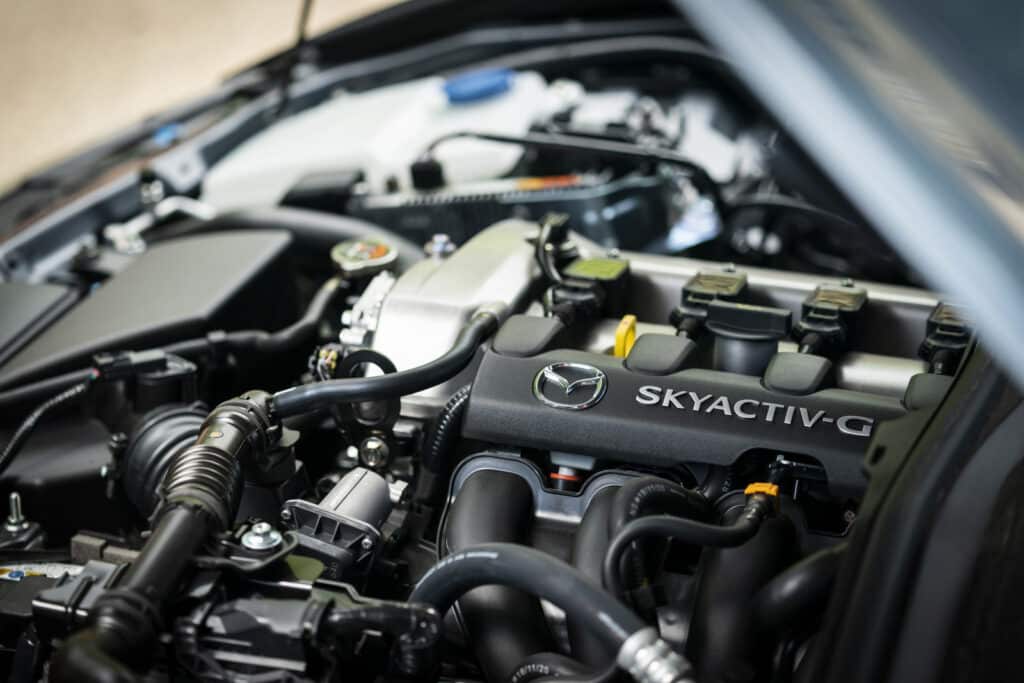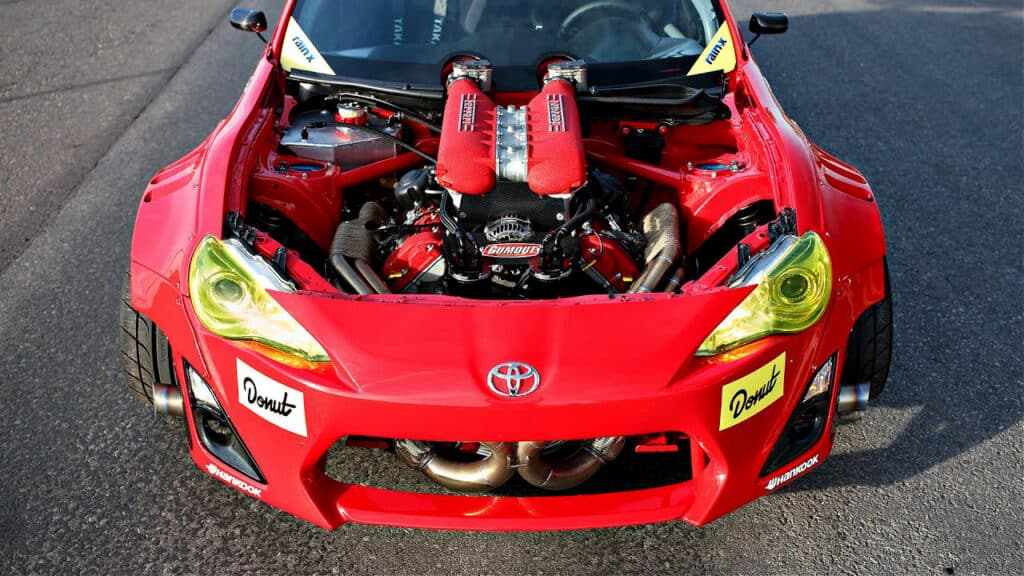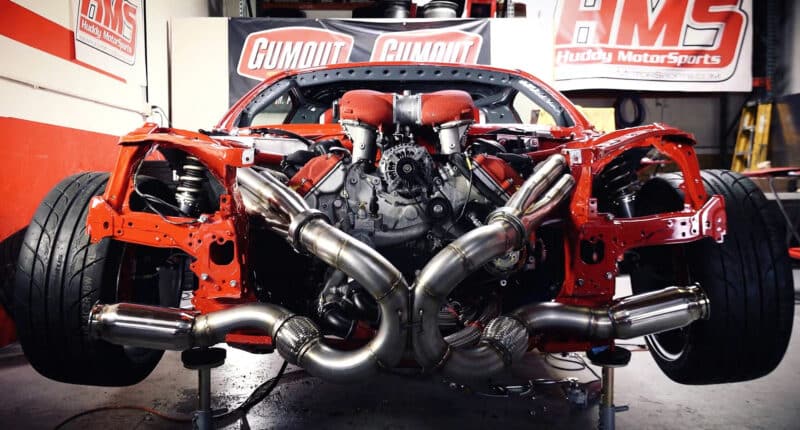There’s more to engine swaps than simply buying a motor, paying someone to install it, and going about your business.
Whether you’re switching to a different engine out of necessity or as a means of making your car go faster, you’re going to have to factor in the laws in your state in order to stay street-legal.
Some places in the U.S. have suffocating laws around upgrades like these, others are more lenient. Depending on where you live, you might have to do things differently to avoid getting in legal trouble.
At the time of writing, engine swaps are legal in all 50 states, but there are some nuances that you should know of before you go ahead with the swap. In this article, we’ll explore the legalities involved when installing a non-standard engine into your car.
Emissions Compliance
The Environmental Protection Agency (EPA) and the California Air Resources Board (CARB) are like the guardians of emission regulations in the United States. When it comes to engine swapping, these agencies have rules in place.
They require cars to follow the emission standards that were set for the year when the it was originally manufactured.
To ensure compliance, the replacement engine needs to be certified by the EPA or CARB for the model year of the engine or a newer one. This certification is essentially a guarantee that the engine meets all the necessary emission standards.

It’s not just about the engine itself. The OEM emission control system, which includes important components like catalytic converters, oxygen sensors, and evaporative emission systems, must be properly installed and working on the new engine.
Then there’s On Board Diagnostics II (OBD-II). This is a device that keeps an eye on various vital functions of your car, including the emission control system.
If you’re swapping engines, the new engine must be compatible with your car’s original OBD-II system. It should be able to communicate with it and report any emissions-related data accurately.
Smog Certification
Getting a smog certification is a crucial part of engine swapping in the United States. It involves putting the car’s emissions to the test to make sure they meet the standards established by regulatory agencies.
The following states enforce smog certification laws:
- Arizona
- California
- Colorado
- Connecticut
- Delaware
- District of Columbia
- Georgia
- Idaho: Mandatory vehicle emissions testing was repealed, effective July 1, 2023.
- Illinois
- Indiana
- Louisiana
- Maine
- Maryland
- Massachusetts
- Nevada
- New Hampshire
- New Jersey
- New Mexico
- New York
- North Carolina
- Ohio
- Oregon
- Pennsylvania
- Rhode Island
- Texas
- Utah
- Vermont
- Virginia
- Washington: No mandatory emissions inspections, effective Jan. 1, 2020, Vehicle Emission Check Program Ended.
- Wisconsin: Emissions testing is required for the following counties: Kenosha, Milwaukee, Ozaukee, Racine, Sheboygan, Washington, Waukesha.
Engine Age Limitations
Age limitations for engine swaps in the U.S. are guidelines that ensure your replacement engine meets or exceeds the necessary emissions standards.
To safeguard the environment, the federal government, through the Environmental Protection Agency (EPA), enforces the Clean Air Act, which establishes emissions standards for vehicles across the United States.
When it comes to engine swaps, the EPA requires the replacement engine to adhere to the emissions standards of either its original manufacturing model year or the model year of the vehicle receiving the new engine, whichever is more recent.
Safety and Complementary Mods
To keep your engine-swapped car safe and street legal, you need to ensure that whatever modifications you’ve made don’t take away from the car’s structural integrity or affect its driveability in a negative way.
For instance, if you’re LS-swapping a Miata, you want to make sure you’ve beefed up the suspension and drivetrain components to compensate for the added weight and power.
There’s a lot more to it than that. Engine swaps can be incredibly complex and will require you to swap out several other components including those from your cooling, fueling, and exhaust system.
Remember that specific requirements can vary depending on the state, so it’s always a good idea to consult your local Department of Motor Vehicles or relevant authorities for accurate and up-to-date information on safety inspections and engine swapping regulations in your area.
Certified Mechanics

In several states across the U.S., there is a requirement for engine swaps to be performed by certified mechanics. The rationale behind these regulations is rooted in the recognition that engine swaps are complex and pose potential safety risks if not done correctly.
The certification requirements for mechanics can vary by state. Some states may have their own certification programs, while others may recognize national certifications such as those offered by the National Institute for Automotive Service Excellence (ASE).
If your car is under warranty, it’s important to check whether an engine swap performed by a non-certified mechanic could potentially void the warranty. The following states require certified mechanics to do the engine swap:
1. California
2. New York
3. New Jersey
4. Massachusetts
5. Pennsylvania
6. Illinois
7. Washington
8. Maryland
9. Connecticut
10. Maine
It’s important to note that laws change and that you should check with your local DMV before making serious modifications to your car.
Collectable Cars

Some states offer special registration or license plates for collectable cars, which may have specific requirements or allowances for engine modifications. Researching the regulations and eligibility criteria for historical vehicle registration in your state is essential.
While these cars may have lenient emissions regulations compared to modern cars, engine swaps can still affect emissions compliance. Some states have exemptions or certifications related to engine modifications, so it’s important to check the emissions requirements.
Inspections by authorized experts or organizations specializing in vintage vehicle restorations may be necessary, along with documentation related to the engine swap.
Consulting with professionals specializing in vintage vehicle restorations and engaging with local authorities will help ensure compliance and the preservation of your vintage car’s authenticity.
Referee Inspection

Referee inspections for engine swapping in the U.S. are conducted to verify compliance with emissions standards and safety regulations. These inspections are typically required in California, New York, Massachusetts, Nevada, Washington, and Colorado.
Referee inspections are conducted by knowledgeable experts or specialized centers authorized by state authorities; they’ll assess the installation, emissions control equipment, wiring, and other relevant aspects of your engine swap.
Owners must gather necessary documentation, such as the source of the engine and modification details, before scheduling an inspection with the local DMV or BAR.
If the engine swap passes inspection, a compliance certificate is issued, affirming adherence to standards. It is important to consult local authorities for state-specific guidelines, as procedures can vary.
Additionally, in some states, including the ones mentioned, the referee sticks a label that usually has the VIN number, the new engine’s make, model, and year, and any applicable emission control information.
State-By-State Engine Swapping Laws
Engine swapping laws in the United States can vary significantly by state, with each having different requirements for emission standards, inspections, and other regulations. Here’s a state-by-state round-up for your reference:
| State | Emission Standards | Certification Requirements | OBD-II Compatibility | Inspection Requirements | Additional Notes |
| Alabama | Must meet original vehicle’s emission standards | EPA or CARB certification required | Must be compatible | State emissions testing required in certain counties | Consult local DMV for specific swap rules |
| Alaska | Meets EPA standards; no CARB requirements | EPA-certified engine required | OBD-II must be compatible | Emissions inspection required in urban areas | Check for local emissions exemptions in rural areas |
| Arizona | Follows EPA emission standards | Engine must be EPA certified | Compatible with OBD-II | Inspections required for certain vehicles | Check with state DMV for any special exemptions |
| California | Strict CARB requirements | Engine must meet CARB standards | Must comply with OBD-II | Extensive emissions testing required | CARB compliance is mandatory for all vehicles |
| Colorado | Must meet original vehicle’s emissions | EPA or CARB certified engine required | OBD-II must be operational | State emissions testing required | Urban areas subject to stricter regulations |
| Connecticut | Meets EPA standards; no CARB requirements | EPA certified engine required | OBD-II must be compatible | Emissions inspection required | Vehicle must pass emissions to register |
| Delaware | Follows EPA standards | EPA-certified engine required | OBD-II compatibility required | Emissions testing required in certain counties | Specific rules for older vehicles |
| Florida | Meets EPA standards | EPA certified engine required | OBD-II required for 1996+ models | No emissions testing in most areas | Local counties may have additional requirements |
| Georgia | Must meet EPA standards | Engine must be EPA certified | OBD-II must be compatible | Emissions testing required in Atlanta area | No emissions testing outside metro areas |
| Hawaii | Must meet CARB and EPA standards | CARB-certified engine required | OBD-II compatibility required | Emissions testing required statewide | Hawaii has strict air quality standards |
| Idaho | Meets EPA emission standards | EPA-certified engine required | OBD-II must be operational | Emissions testing in urban areas | No emissions testing in rural areas |
| Illinois | Follows EPA standards | EPA-certified engine required | OBD-II required for 1996+ models | Emissions testing in some areas | Vehicle must pass emissions to register |
| Indiana | Follows EPA standards | EPA-certified engine required | OBD-II must be compatible | Emissions testing required in certain counties | Check local county regulations |
| Iowa | Meets EPA standards | Engine must be EPA certified | OBD-II compatibility required | No emissions testing statewide | Rural areas may not require testing |
| Kansas | Follows EPA standards | EPA-certified engine required | OBD-II must be operational | No emissions testing statewide | Emissions testing may be required in larger cities |
| Kentucky | Must meet EPA standards | EPA-certified engine required | OBD-II must be compatible | Emissions testing required in some counties | Some areas exempt older vehicles |
| Louisiana | Meets EPA standards | EPA-certified engine required | OBD-II must be compatible | Emissions testing required in some areas | Check local DMV for specific exemptions |
| Maine | Meets EPA standards | EPA-certified engine required | OBD-II must be compatible | Emissions inspection required in certain counties | No emissions testing in rural areas |
| Maryland | Meets EPA standards | EPA-certified engine required | OBD-II must be compatible | Emissions testing required statewide | Older vehicles may be exempt from emissions testing |
| Massachusetts | Must meet EPA standards | EPA or CARB certified engine required | OBD-II compatibility required | Emissions testing required statewide | CARB-compliant engine required for certain vehicles |
| Michigan | Must meet EPA standards | EPA-certified engine required | OBD-II must be compatible | Emissions testing required in some counties | Check local county regulations |
| Minnesota | Meets EPA standards | EPA-certified engine required | OBD-II required for 1996+ models | Emissions inspection required | Older vehicles may have fewer requirements |
| Mississippi | Meets EPA standards | EPA-certified engine required | OBD-II compatibility required | No emissions testing statewide | Check local county regulations |
| Missouri | Follows EPA standards | EPA-certified engine required | OBD-II must be compatible | Emissions testing required in St. Louis area | Vehicle must pass emissions to register |
| Montana | Meets EPA standards | EPA-certified engine required | OBD-II must be compatible | No emissions testing statewide | Rural areas have fewer regulations |
| Nebraska | Follows EPA standards | EPA-certified engine required | OBD-II compatibility required | No emissions testing statewide | Check local requirements |
| Nevada | Meets EPA standards | EPA-certified engine required | OBD-II required for 1996+ models | Emissions testing required in Las Vegas and Reno | Emission testing in urban areas |
| New Hampshire | Meets EPA standards | EPA-certified engine required | OBD-II must be compatible | No emissions testing statewide | Older vehicles may be exempt from testing |
| New Jersey | Meets EPA standards | EPA-certified engine required | OBD-II required for 1996+ models | Emissions testing required statewide | CARB-compliant vehicles may have additional requirements |
| New Mexico | Follows EPA standards | EPA-certified engine required | OBD-II must be compatible | No emissions testing statewide | Check local county regulations |
| New York | Meets EPA standards | EPA or CARB-certified engine required | OBD-II required for 1996+ models | Emissions testing required in some counties | CARB-compliant vehicles required in certain regions |
| North Carolina | Must meet EPA standards | EPA-certified engine required | OBD-II must be compatible | Emissions testing required in urban areas | Check local county requirements |
| North Dakota | Follows EPA standards | EPA-certified engine required | OBD-II compatibility required | No emissions testing statewide | Check local county requirements |
| Ohio | Meets EPA standards | EPA-certified engine required | OBD-II must be compatible | Emissions testing required in Cleveland area | Older vehicles may be exempt |
| Oklahoma | Meets EPA standards | EPA-certified engine required | OBD-II required for 1996+ models | No emissions testing statewide | Check local county regulations |
| Oregon | Follows EPA standards | EPA or CARB certified engine required | OBD-II required | Emissions testing required in some areas | CARB-compliant vehicles for some areas |
| Pennsylvania | Meets EPA standards | EPA-certified engine required | OBD-II must be compatible | Emissions testing required in certain counties | Check local county regulations |
| Rhode Island | Meets EPA standards | EPA-certified engine required | OBD-II must be compatible | Emissions testing required statewide | Check DMV for specific vehicle exemptions |
| South Carolina | Follows EPA standards | EPA-certified engine required | OBD-II compatibility required | No emissions testing statewide | Check local DMV regulations |
| South Dakota | Meets EPA standards | EPA-certified engine required | OBD-II must be compatible | No emissions testing statewide | Rural areas have fewer requirements |
| Tennessee | Meets EPA standards | EPA-certified engine required | OBD-II must be compatible | No emissions testing statewide | Check local county regulations |
| Texas | Meets EPA standards | EPA-certified engine required | OBD-II required for 1996+ models | Emissions testing in some counties | Check local county regulations |
| Utah | Meets EPA standards | EPA-certified engine required | OBD-II must be compatible | Emissions testing required in certain areas | Rural areas may have fewer regulations |
| Vermont | Follows EPA standards | EPA-certified engine required | OBD-II compatibility required | Emissions testing required statewide | Some older vehicles exempt from testing |
| Virginia | Meets EPA standards | EPA-certified engine required | OBD-II must be compatible | Emissions testing required statewide | Urban areas may have stricter emissions regulations |
| Washington | Meets EPA standards | EPA or CARB-certified engine required | OBD-II must be compatible | Emissions testing in some areas | CARB-compliant engine required for certain vehicles |
| West Virginia | Meets EPA standards | EPA-certified engine required | OBD-II required for 1996+ models | Emissions testing required statewide | Rural areas may be exempt |
| Wisconsin | Meets EPA standards | EPA-certified engine required | OBD-II must be compatible | No emissions testing statewide | Check local county regulations |
| Wyoming | Meets EPA standards | EPA-certified engine required | OBD-II compatibility required | No emissions testing statewide | Check local requirements |
Note that state-specific details may vary based on local ordinances, vehicle age, and engine compatibility. It’s always recommended to consult your state’s Department of Motor Vehicles (DMV) or local authorities for the most accurate and up-to-date information on engine swap regulations.
Final Thoughts

It’s crucial to bear in mind that laws and regulations pertaining to engine swapping can evolve over time, and they may vary between cities within a state due to specific local ordinances or other factors.
To safeguard your efforts from going to waste, it’s highly recommended to diligently research and understand the legalities surrounding engine swapping.
Make it a priority to consult your local Department of Motor Vehicles (DMV) or the appropriate organization responsible for vehicle regulations. By taking this proactive step, you can ensure compliance with the law and protect the fruits of your hard work.
Have you ever gotten into legal trouble over an engine swap? Let us know your experience by leaving a comment below!

